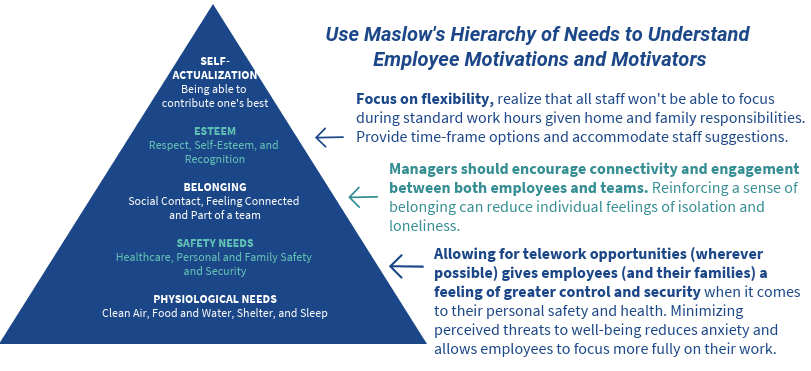Effectively Manage Teleworkers and Virtual Teams
As the world responds to COVID-19, organizations are turning to virtual methods of interaction to continue operations. Evans Consulting has developed the “Telework Manifesto” a best-practices guide for managers and their teams.

Acknowledge that a completely virtual workplace is new for almost everyone. As a result, many employees will look to their leaders for guidance. This may be a good time to designate a role within the team for capturing and sharing best practices around virtual teams.
Work with each of your employees to help make their individual telework arrangements as productive as possible. Many staff members will appreciate receiving clear expectations from their managers as it will provide structure and help them plan their days.

Be diligent about communicating pro-actively. You may feel as if you’re over-communicating, but your team will appreciate knowing that the lines of communication are open and that you are there to support them as they adjust to this new situation.
Here are 10 tips to manage virtual teams:
- Set up ‘Virtual Office Hours’ and encourage your staff to contact you during this time.
- Structure meetings that promote interactivity. Leverage virtual ice breakers, polling software, and utilize video (as applicable) to encourage participation.
- Stay in touch with your management so you can pass on emerging priorities to your team.
- Check in frequently with both individuals and groups to see how they are doing in their new work environments. Help employees address remote access barriers when necessary.
- Encourage employee feedback by sending out a weekly survey – collect questions from your employees and ask for feedback on how communication is going.
- Send a daily update about priorities, key deadlines, and issues relevant to all staff. Utilize video meetings to reinforce messages.
- Lead your virtual team by example. Encourage them to take regular breaks and add structure to their work days.
- Leverage praise liberally, especially for specific actions. Make sure that remote employees feel appreciated.
- Encourage your team to share lessons learned via virtual message boards and regular round-table discussions. Perhaps assign the role of a knowledge management facilitator to document new norms and techniques.
- Promote collaborative projects that establish and nurture connections within your team. within your team.




